Related Research Articles
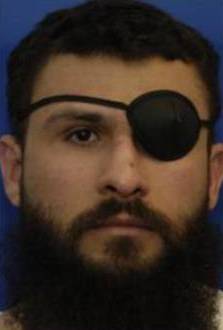
Abu Zubaydah is a Palestinian citizen and alleged terrorist born in Saudi Arabia currently held by the U.S. in the Guantanamo Bay detention camp in Cuba. He is held under the authority of Authorization for Use of Military Force Against Terrorists (AUMF).

Charles A. Graner Jr. is an American former soldier who was court-martialed for prisoner abuse after the 2003–2004 Abu Ghraib prisoner abuse scandal. Along with other soldiers of his Army Reserve unit, the 372nd Military Police Company, Graner was accused of allowing and inflicting sexual, physical, and psychological abuse on Iraqi detainees in Abu Ghraib prison, a notorious prison in Baghdad during the United States' occupation of Iraq.

During the early stages of the Iraq War, members of the United States Army and the Central Intelligence Agency committed a series of human rights violations and war crimes against detainees in the Abu Ghraib prison in Iraq, including physical abuse, sexual humiliation, physical and psychological torture, and rape, as well as the killing of Manadel al-Jamadi and the desecration of his body. The abuses came to public attention with the publication of photographs of the abuse by CBS News in April 2004. The incidents caused shock and outrage, receiving widespread condemnation within the United States and internationally.
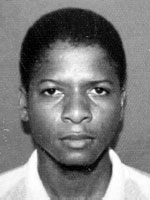
Ahmed Khalfan Ghailani is a Tanzanian conspirator of the al-Qaeda terrorist organization convicted for his role in the bombing of embassies in Kenya and Tanzania. He was indicted in the United States as a participant in the 1998 U.S. embassy bombings. He was on the FBI Most Wanted Terrorists list from its inception in October 2001. In 2004, he was captured and detained by Pakistani forces in a joint operation with the United States, and was held until June 9, 2009, at Guantanamo Bay detention camp; one of 14 Guantanamo detainees who had previously been held at secret locations abroad. According to The Washington Post, Ghailani told military officers he is contrite and claimed to be an exploited victim of al-Qaeda operatives.
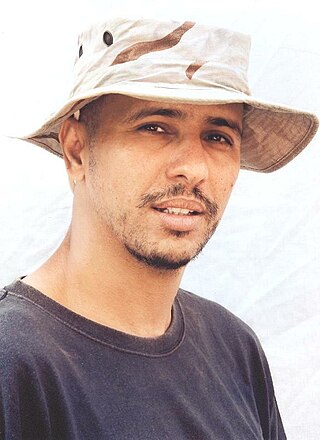
Mohamedou Ould Slahi is a Mauritanian engineer who was detained at Guantánamo Bay detention camp without charge from 2002 until his release on October 17, 2016.

Abd al-Rahim Hussein Muhammed Abdu al-Nashiri is a Saudi Arabian citizen alleged to be the mastermind of the bombing of USS Cole and other maritime attacks. He is alleged to have headed al-Qaeda operations in the Persian Gulf and the Gulf states prior to his capture in November 2002 by the CIA's Special Activities Division.
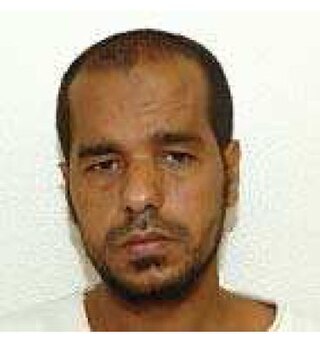
Salim Ahmed Salim Hamdan is a Yemeni man, captured during the invasion of Afghanistan, declared by the United States government to be an illegal enemy combatant and held as a detainee at Guantanamo Bay from 2002 to November 2008. He admits to being Osama bin Laden's personal driver and said he needed the money.
American officials have reported that the late al Qaeda leader Osama bin Laden had numerous bodyguards. They reported that the detainees held in the Guantanamo Bay detention camp included at least 30 of Bin Laden's bodyguards.

Susan Jean Crawford is an American lawyer, who was appointed the Convening Authority for the Guantanamo military commissions, on February 7, 2007. Secretary of Defense Robert Gates appointed Crawford to replace John D. Altenburg.

Loretta A. Preska is an American lawyer who serves as a senior United States district judge of the United States District Court for the Southern District of New York. Born in Albany, Preska received law degrees from Fordham University School of Law and New York University School of Law. She practiced law in New York City from 1973 to 1992 at the law firms of Cahill Gordon & Reindel and Hertzog, Calamari & Gleason. President George H. W. Bush appointed her to the district bench in 1992. She served as chief judge of the court for a seven-year term from 2009 to 2016, and took senior status in 2017. President George W. Bush nominated Preska to the U.S. Court of Appeals for the Second Circuit in 2008, but the Senate did not act on the nomination.
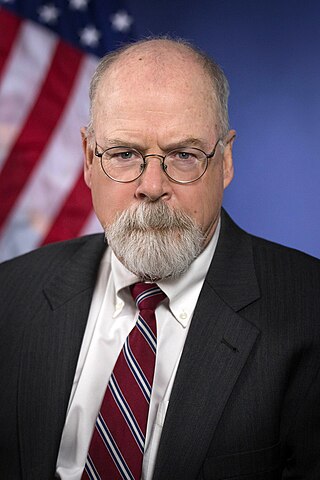
John Henry Durham is an American lawyer who served as the United States Attorney for the District of Connecticut from 2018 to 2021. By April 2019, the Trump administration assigned him to investigate the origins of the Federal Bureau of Investigation (FBI) investigation into Russian interference in the 2016 U.S. elections, and in October 2020 he was appointed special counsel for the Department of Justice on that matter.
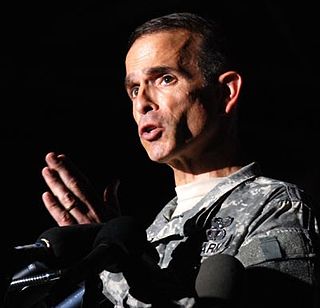
Attorney Lawrence J. Morris is the chief of staff and counselor to the president at The Catholic University of America and a retired United States Army colonel.
Joshua R. Claus is a former member of the United States Army, whose unit was present at both Iraq's Abu Ghraib and at the Bagram Theater Detention Facility in Afghanistan, and was the first interrogator of Guantanamo detainee Omar Khadr. In 2005, he was found guilty of maltreatment and assault against an Afghanistan detainee who later died.
This page lists trials related to the September 11, 2001, terrorist attacks.

Lewis Avins Kaplan is an American lawyer and jurist who serves as a senior United States district judge of the United States District Court for the Southern District of New York. He was the presiding judge in a number of cases involving high-profile defendants, including E. Jean Carroll v. Donald J. Trump, Virginia Giuffre v. Prince Andrew,United States v. Bankman-Fried, and trials of Al Qaeda terrorists such as Ahmed Ghailani.
James Elmer Mitchell is an American psychologist and former member of the United States Air Force. From 2002, after his retirement from the military, to 2009, his company Mitchell Jessen and Associates received $81 million on contract from the CIA to carry out the torture of detainees, referred to as "enhanced interrogation techniques" that resulted in little credible information.

Jameel Jaffer is a Canadian human rights and civil liberties attorney and the inaugural director of the Knight First Amendment Institute at Columbia University, which was created to defend the freedoms of speech and the press in the digital age. The Institute engages in "strategic litigation, research, and public education." Among the Knight Institute's first lawsuits was a successful constitutional challenge to President Trump's practice of blocking critics from his Twitter account.

John Bruce Jessen is an American psychologist who, with James Elmer Mitchell, created the so-called "enhanced interrogation techniques" that were used in the interrogation and torture of CIA detainees and outlined in the United States Senate Select Committee on Intelligence's report on CIA torture. In that report, he was mentioned under the pseudonym "Hammond Dunbar." His company, Mitchell Jessen and Associates, earned US$81 million for its work.
Valentine Mlowola is a senior official with the Tanzanian government.
Statements obtained under torture are not admissible evidence in court proceedings in many jurisdictions.
References
- 1 2 3 4 5 6 Benjamin Weiser (2010-09-20). "Witness in 1998 Bombings Is Identified at a Hearing". The New York Times . p. A26. Archived from the original on 2018-05-26. Retrieved 2020-08-28.
'This is the moment,' said Karen J. Greenberg, executive director of the Center on Law and Security at New York University, who observed the hearing. 'This will establish the standard for how we deal with witnesses and other evidence that's the result of torture.'
- ↑ Benjamin Weiser (2010-11-18). "Detainee Acquitted on Most Counts in '98 Bombings". The New York Times . Retrieved 2020-08-28.
In the ruling, the judge, Lewis A. Kaplan of Federal District Court in Manhattan, barred prosecutors from using an important witness against Mr. Ghailani because the government had learned about the man through Mr. Ghailani's interrogation while he was in C.I.A. custody, where his lawyers say he was tortured.
- ↑ Benjamin Weiser (2010-10-06). "Judge Bars Major Witness From Terrorism Trial". The New York Times . p. A1. Retrieved 2020-08-28.
- ↑ Benjamin Weiser (2010-10-11). "No Appeal in Exclusion of Witness in Terror Trial". The New York Times . p. A20. Retrieved 2020-08-28.
Judge Kaplan has filed a more complete ruling, but it is going through a declassification process. Still, his brief order last week intensified the debate over whether other detainees, like Khalid Shaikh Mohammed, the professed mastermind behind the 9/11 attacks, should be tried in the civilian system, a goal the Obama administration has advocated.
- ↑ Benjamin Weiser (2010-10-15). "Judge Says Key Figure in Embassies Bombing Case Isn't Credible". The New York Times . p. A28. Retrieved 2020-08-28.
In a decision made public on Thursday, the judge elaborated on his reasoning. He said he had concluded that Mr. Abebe feared being arrested if he did not cooperate with the authorities.
- ↑ Benjamin Weiser (2010-10-01). "Judge Delays Detainee's Trial Over Issue of Witness". The New York Times . Retrieved 2020-08-28.
Lawyers for Mr. Ghailani contend that he underwent coercive interrogation and torture while in C.I.A. custody, and that any statements or evidence derived from them is tainted and inadmissible. The government has said Mr. Abebe's decision to cooperate was voluntary and only remotely linked to Mr. Ghailani's interrogation.
- ↑ "Blow to US prosecutors as terror case witness barred". BBC News . 2020-10-06. Retrieved 2020-08-28.
The BBC's Laura Trevelyan in New York says the judge's decision - if it stands - is a major setback for the US government's case.
- ↑ Richard L. Abel (2018). Law's Trials: The Performance of Legal Institutions in the US 'War on Terror'. Cambridge University Press. p. 64. ISBN 9781108429757 . Retrieved 2020-08-28.
Although the government claimed it would have found Abebe without Ghailani's evidence, Kaplan said "that would have been roughly comparable to finding a particular individual named John or Bill in a stat with a population around the size of Maine or New Hampshire ... while knowing little more about him than that he was regarded as prominent in a significant industry in the state.
- ↑ Nat Hentoff (2010-10-20). "Can We Try Terrorism in Our Civilian Constitutional Courts?". Cato Institute . Retrieved 2020-08-29.
These memos gave the torturers in the field and Bush and Cheney up high the invented "legal" justification for the savage treatment that broke Ghailani into revealing the man, Abebe, who would connect him to the 1998 atrocities. Goldsmith rejected some of those practices, but others remained.
- ↑ "Tanzanian man who supplied explosives seeks to clear his name, if US judge will let him". Guelph Mercury . New York City. 2010-09-15. Retrieved 2020-08-28.
Abebe was located and questioned in 2006 by Tanzanian law enforcement authorities. At the time, he was a cab driver.
- ↑ Tung Yin (2011). ""Anything but Bush?": The Obama administration and Guantanamo Bay" (PDF). Harvard Journal of Law & Public Policy . 34 (2): 484–487. Retrieved 2020-09-30.
There does not appear to be any reason to believe that the United States would have discovered Abebe independently, but one could argue that permitting Abebe to testify against Ghailani would be "consistent with the interests of justice" for a number of reasons.
- ↑ Michael Perich (2012). "Media Influence in the Ghailani Trial: Have We Seen This Before? The Ever-Growing Importance of an Independent Judiciary". Washington University Jurisprudence Review . 4 (2): 374–375. Retrieved 2020-09-30.
Not only does Judge Kaplan express regret at his decision to not allow Abebe as a witness, but he even mentions that regardless of the verdict, Ghailani will likely remain imprisoned indefinitely due to his status as an enemy combatant.
- ↑ Stephen Dycus; William C. Banks; Peter Raven-Hansen; Stephen I. Vladeck (2016). Counterterrorism Law: Aspen Casebook Series. Wolters Kluwer Law & Business. ISBN 9781454881131 . Retrieved 2020-09-30.
It interrogated him in the secret prison for [REDACTED] Over time, Ghailani gave the CIA the information that led the government directly to Hussein Abebe -- [REDACTED]
- ↑ Tod Hoffman (2014). Al Qaeda Declares War: The African Embassy Bombings and America's Search for Justice. ForeEdge. ISBN 9781611685657 . Retrieved 2020-09-30.
- ↑ Karen J. Greenberg (2010-10-15). "Terror Trial Update: Baby Lulu and the Two Ahmeds". Mother Jones magazine . Archived from the original on 2017-06-18. Retrieved 2020-08-28.
The tone for the day, however, was set by Judge Kaplan, who the previous night had released the (redacted) long version of his opinion barring the testimony of a government's key witness, Hussein Abebe. In an opinion that reasoned backwards to Deuteronomy and forward, in theory, to any future Guantanamo cases where the prosecution might attempt to bring witnesses identified via the torture of the defendant, the judge asserted not just his expertise in legal philosophy and precedent, but confidence in his ability to assess the witness's credibility. Throughout his opinion, he refers to the testimony of Abebe as "inaccurate," "incredible," "inconsistent," and consisting of "prevarications."
- ↑ Karen J. Greenberg (2010-10-20). "Terror Trial Update: The Fear Factor". Mother Jones magazine . Archived from the original on 2017-06-17. Retrieved 2020-08-28.
Judge Lewis Kaplan, who so far in this case has seemed the most adept at coaxing a revealing narrative out of witnesses, once again extracted a telling detail. "Did any FBI agents speak to you in Swahili?" Judge Kaplan asked. "No," said Mohammed, "only translators, and police officers from Tanzania." Was Mohammed right to be worried about the Tanzanian authorities? He wouldn't be the first. In his opinion upholding the suppression of the witness Hussein Abebe (see earlier posts), Judge Kaplan noted that Tanzanian police had warned him, ahead of his own interrogations, "to tell what he knew so that he could go home, in itself an implicit threat…[Abebe] was aware also that the TNP sometimes had been known to detain people without their families knowing where they had been taken and to 'come and grab you and take you by force.'"
- ↑ Adam Serwer (2010-10-07). "Torture And Ghailani". American Prospect . Retrieved 2020-08-29.
For the right, it's a disaster -- proof that civilian courts can't handle terrorism prosecutions. For the left, it's something else -- the first court ruling that suggests that the Bush administration's "enhanced interrogation" techniques were illegal.
- ↑ Adam Klasfeld (2010-11-02). "Government Wrapping Up Its Case In First Gitmo Detainee Civil Trial". Courthouse News . Manhattan . Retrieved 2020-08-28.
Ghailani's attorney Steve Zissou said Monday that the defense will open its case by calling Valentine Mlowola, former senior superintendent for the Tanzanian National Police. Mlowola's botched interrogation of prospective government witness Hussein Abebe led U.S. District Judge Lewis Kaplan, before the trial began, to bar prosecutors from calling Abebe to testify.
- ↑ Adam Klasfeld (2010-12-30). "Attorneys for Guantanamo Prisoner|Ahmed Ghailani Seek New Trial". Courthouse News . Manhattan . Retrieved 2020-08-29.
Farbiarz's rebuttal summation 'essentially attempted to take the Abebe preclusion order and turn it on its head, capitalizing with disingenuous arguments that it could never have made had Abebe testified at trial,' the motion states. It adds that 'this should not be permitted to stand.'